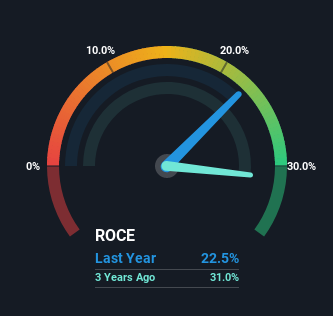The Returns On Capital At United Spirits (NSE:MCDOWELL-N) Don't Inspire Confidence

What trends should we look for it we want to identify stocks that can multiply in value over the long term? Ideally, a business will show two trends; firstly a growing return on capital employed (ROCE) and secondly, an increasing amount of capital employed. This shows us that it's a compounding machine, able to continually reinvest its earnings back into the business and generate higher returns. So while United Spirits (NSE:MCDOWELL-N) has a high ROCE right now, lets see what we can decipher from how returns are changing.
What Is Return On Capital Employed (ROCE)?
For those that aren't sure what ROCE is, it measures the amount of pre-tax profits a company can generate from the capital employed in its business. The formula for this calculation on United Spirits is:
Return on Capital Employed = Earnings Before Interest and Tax (EBIT) ÷ (Total Assets - Current Liabilities)
0.22 = ₹13b ÷ (₹101b - ₹42b) (Based on the trailing twelve months to December 2022).
So, United Spirits has an ROCE of 22%. That's a fantastic return and not only that, it outpaces the average of 15% earned by companies in a similar industry.
Check out our latest analysis for United Spirits

In the above chart we have measured United Spirits' prior ROCE against its prior performance, but the future is arguably more important. If you'd like to see what analysts are forecasting going forward, you should check out our free report for United Spirits.
What The Trend Of ROCE Can Tell Us
On the surface, the trend of ROCE at United Spirits doesn't inspire confidence. To be more specific, while the ROCE is still high, it's fallen from 33% where it was five years ago. However, given capital employed and revenue have both increased it appears that the business is currently pursuing growth, at the consequence of short term returns. And if the increased capital generates additional returns, the business, and thus shareholders, will benefit in the long run.
On a side note, United Spirits has done well to pay down its current liabilities to 42% of total assets. That could partly explain why the ROCE has dropped. What's more, this can reduce some aspects of risk to the business because now the company's suppliers or short-term creditors are funding less of its operations. Some would claim this reduces the business' efficiency at generating ROCE since it is now funding more of the operations with its own money. Either way, they're still at a pretty high level, so we'd like to see them fall further if possible.
What We Can Learn From United Spirits' ROCE
In summary, despite lower returns in the short term, we're encouraged to see that United Spirits is reinvesting for growth and has higher sales as a result. In light of this, the stock has only gained 26% over the last five years. Therefore we'd recommend looking further into this stock to confirm if it has the makings of a good investment.
While United Spirits doesn't shine too bright in this respect, it's still worth seeing if the company is trading at attractive prices. You can find that out with our FREE intrinsic value estimation on our platform.
If you'd like to see other companies earning high returns, check out our free list of companies earning high returns with solid balance sheets here.
New: AI Stock Screener & Alerts
Our new AI Stock Screener scans the market every day to uncover opportunities.
• Dividend Powerhouses (3%+ Yield)
• Undervalued Small Caps with Insider Buying
• High growth Tech and AI Companies
Or build your own from over 50 metrics.
Have feedback on this article? Concerned about the content? Get in touch with us directly. Alternatively, email editorial-team (at) simplywallst.com.
This article by Simply Wall St is general in nature. We provide commentary based on historical data and analyst forecasts only using an unbiased methodology and our articles are not intended to be financial advice. It does not constitute a recommendation to buy or sell any stock, and does not take account of your objectives, or your financial situation. We aim to bring you long-term focused analysis driven by fundamental data. Note that our analysis may not factor in the latest price-sensitive company announcements or qualitative material. Simply Wall St has no position in any stocks mentioned.
About NSEI:UNITDSPR
United Spirits
Engages in the manufacture, sale, and distribution of alcoholic beverages and other allied spirits in India and internationally.
Flawless balance sheet with proven track record.


